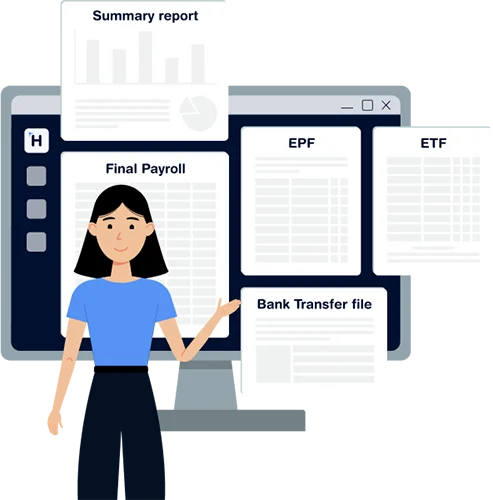Of the numerous administrative headaches small businesses encounter routinely, payroll is the largest. And the numbers globally certainly back this! According to small business HR learning resources hub Workest by Zenefits, 40% of small businesses in the United States report that bookkeeping and taxes are the scariest and most time-consuming part of owning a business.
Handling payroll every month can be overwhelming for a small business and involve numerous practical challenges, particularly if they’re running it themselves and don’t possess the required expertise and skills to handle all necessary calculations properly plus compliance with associated laws governing everything from salary calculations and income tax to social security payments.
Small businesses can also face numerous challenges when outsourcing their payroll, from confidentiality issues surrounding sensitive payroll information to incorrect staff salary payments.
Therefore, this article will explore the diverse challenges small businesses face involving payroll in creating improved payroll awareness among small businesses while also exploring the pros and cons of how most small Sri Lankan businesses currently handle payroll.
An Exploration of Common Small Business Payroll Challenges
According to American financial software leader Intuit, a quarter of all workers had paycheck errors according to a recent QuickBooks survey involving 1,000 employees across the US. Also, it was discovered that paychecks were more likely to be delayed in companies with 20 employees or fewer. Basically, small businesses!
Such issues have led to greater employee dissatisfaction, costly fines involving labour laws and taxes, and reputation damage to small businesses. Its impact on employee satisfaction, too, is significant.
Global human resource management software leader Kronos reported that 49% of employees would start looking for another company following two paycheck errors. This indicates how employees value their time, effort and money and will not tolerate such critical errors as incorrect or delayed salary payments from their employer.
Here in Sri Lanka as well, more so than before, the current economic situation requires that small businesses be mindful when running payroll and avoid such mistakes to ensure a smooth administrative and operations environment to navigate this difficult period.
Below we consider the nine biggest payroll challenges experienced in 2022, according to Indian HR and Payroll software giant Zimyo, applicable to small businesses.
- Strict compliance with statutory and legislative rules.
- The technological advancement that can make payroll generation inaccurate.
- Need for greater flexibility.
- Lack of payroll professionals.
- Challenges in terms of attendance and leave management.
- Challenges in handling attendance and leave for remote work.
- Consistent automation.
- Data security threats.
- Inconsistency in policies.
Keeping these challenges in mind, let us dive deep and understand the two primary ways most small businesses handle their payroll. They can manage their payroll in-house, or they can opt to outsource their payroll to a payroll service provider.
According to a Deloitte survey on the payroll in North America, 32% of businesses handle payroll in-house, and 24% of businesses outsource their payroll. And both methods of payroll handling come with benefits and challenges.
Let’s first consider
How do small businesses handle their payroll in-house?
Clutch reported that 25% of small businesses use a pen and paper to track down their company finances, and 45% of small businesses don’t have an accountant or bookkeeper. Therefore, let’s dive into the benefits and challenges of in-house payroll to understand the above statistics.
The benefits of in-house payroll
- Confidential and sensitive staff information doesn’t have to be compromised when handling payroll in-house.
- More flexibility in terms of making last-minute changes or corrections to the payroll.
- Complete control over payroll procedure.
Apart from the above benefits, having an internal payroll accountant/ payroll officer will ensure that small businesses can develop a new payroll system or modify the existing payroll process to suit their preferences. Moreover, having an internal payroll officer is cheaper than outsourcing small business payroll to a payroll service provider. However, it all depends on the size of the business.
Challenges of in-house payroll
- The cost of hiring a payroll officer.
- More time needs to be allocated to the process of payroll, which results in other business activities being ignored.
- Cannot wholly integrate business solutions and other benefits.
- The need to comply with necessary government and statutory laws.
- Suppose payroll is handled alone by someone in the business. In that case, there is a possibility of delay in salary payments and incorrect payments, which can disappoint employees, affect their productivity and damage the company’s reputation.
- The risk of facing penalties and fines for improper tax calculations and non-payment of EPF and ETF on time.
- Risk of fraud and disclosing employee’s personal information by an officer who was given the responsibility to handle payroll.
Based on the benefits of having an in-house payroll, it is indicative that small businesses that lack financial expertise in handling in-house payroll may enlist their services from an accountant or a bookkeeper. The role of a payroll accountant is to prepare, generate and maintain payroll documentation by ensuring employee benefits, commissions, the accuracy of payroll information and government policies are claimed. On the other hand, there is a risk of employees’ data being leaked and the cost of hiring a payroll officer.
Therefore, it will be helpful to small businesses to consider outsourcing their payroll to a reputed and trustworthy payroll outsourcing company in Sri Lanka. If you’re still not convinced that your small business should outsource its payroll, here are some reasons why it should:
- Saves time – this is one of the main advantages small businesses receive when outsourcing their payroll. Rather than fretting over complying with the payroll, employers will have more time to focus on growing their business in customer service, sales and product development etc.
- More minor payroll errors – payroll providers will computerize most manual payroll features and minimize mistakes found through manual calculations.
- Improves security – the businesses’ confidential data will be protected through high security due to backup data and multiple server locations.
- Compliance – Payroll providers are up to date with the changing regulations, and thus employers don’t have to complete the necessary paperwork for any government or statutory compliance.
- Integrated data – By integrating payroll with time and attendance, HR applications and other features and benefits provided by the payroll provider, there will be improved data accuracy and easier access to information.
- Employee self-service app – A self-service app allows employees to view their time in and time out and apply for leave through their mobile phones.
- Reduce unwanted costs – although outsourcing payroll comes with a price, it is a wise cost to be incurred compared to the cost of penalties that arise due to manual mistakes. The small business will be able to save a lot of money at this point.
Now that you’ve understood how payroll outsourcing companies in Sri Lanka could benefit your business and its employees, we will consider the potential challenges small businesses face when outsourcing their payroll.
Potential challenges faced by small businesses when outsourcing to payroll outsourcing companies in Sri Lanka
It’s no doubt that different small businesses have different budgets and requirements when choosing an appropriate payroll outsourcing company. Apart from this, there are other challenges too, such as:
- The cost of outsourcing payroll.
- Cyber security and fraud.
- Data security, loss or theft.
- Information access, quality and control of payroll are restricted in certain payroll outsourcing companies in Sri Lanka.
- Confidential and sensitive information about staff has to be shared.
- Specific payroll software can cause glitches in the system, which causes an employee’s salary amount to be overpaid or underpaid.
- Technical glitches in payroll software can lose track of employees’ sick leaves, paid leaves, working hours, and overtime. They can cause inaccuracy on pay slips and the business’s financial reports.
- A bad reputation for the business and a strain on the relationship between the employee and employer is a potential risk if payroll isn’t generated accurately.
By considering the advantages and potential challenges of handling payroll in-house and outsourcing payroll, as discussed above, you can decide which of these two ways of handling payroll works best for your business.
We hope we’ve adequately covered the outsourcing vs in-house payroll debate in a non-partial way, offering more confidence to handle your small business payroll requirement most appropriately.
Resources
https://www.sumhr.com/blog/benefits-of-payroll-software
https://www.netsuite.com/portal/resource/articles/financial-management/small-business-payroll-cost.shtml
https://www.nibusinessinfo.co.uk/content/advantages-and-disadvantages-payroll-software
https://smallbusiness.chron.com/punch-vs-swipe-time-cards-31004.html
https://www.nibusinessinfo.co.uk/content/advantages-and-disadvantages-outsourcing-your-payroll
https://quickbooks.intuit.com/r/payroll/in-house-vs-outsourcing-payroll/
https://www.completepayrollsolutions.com/blog/payroll-outsourcing-problems
https://www.zimyo.com/insights/biggest-payroll-challenges-in-2019/



